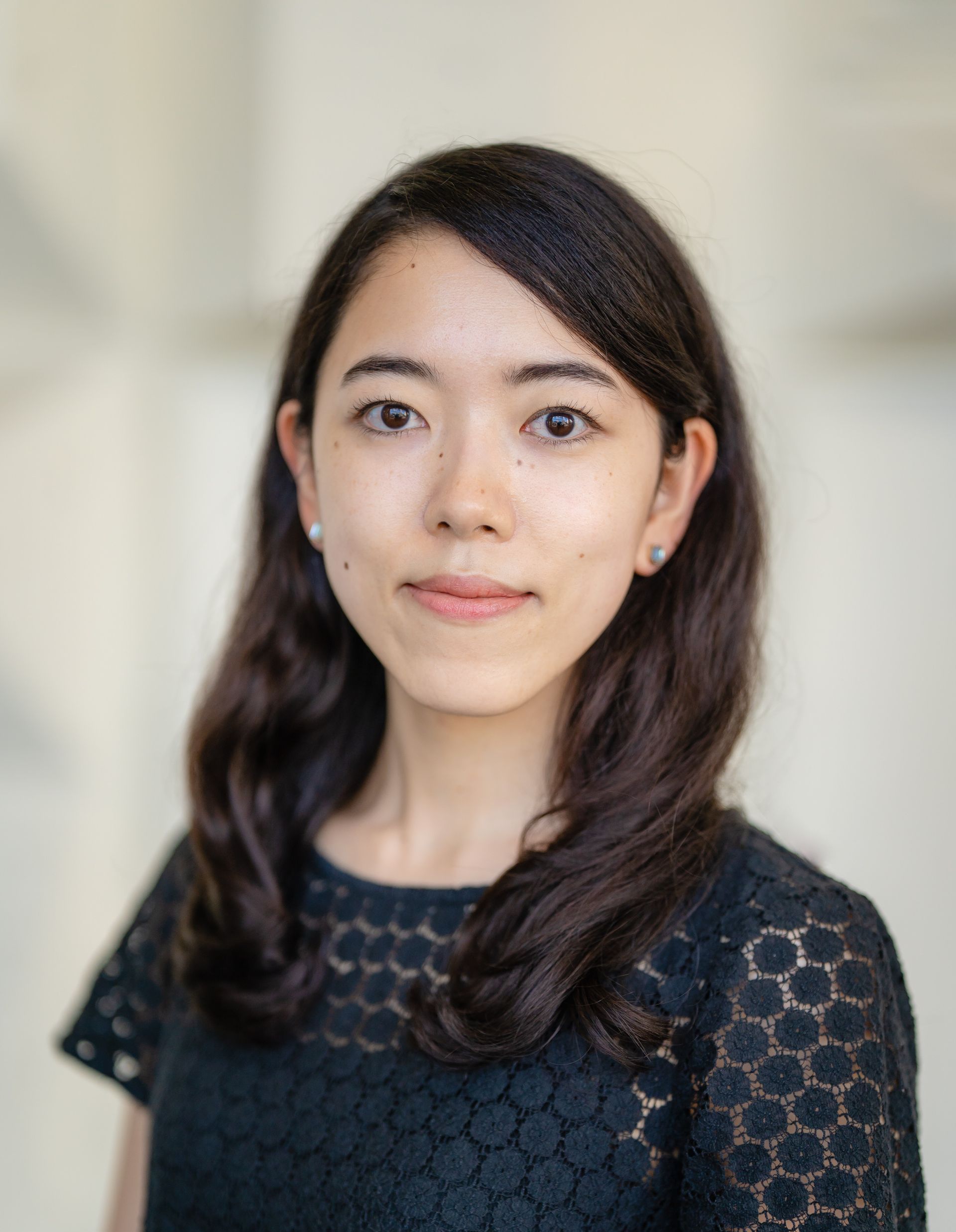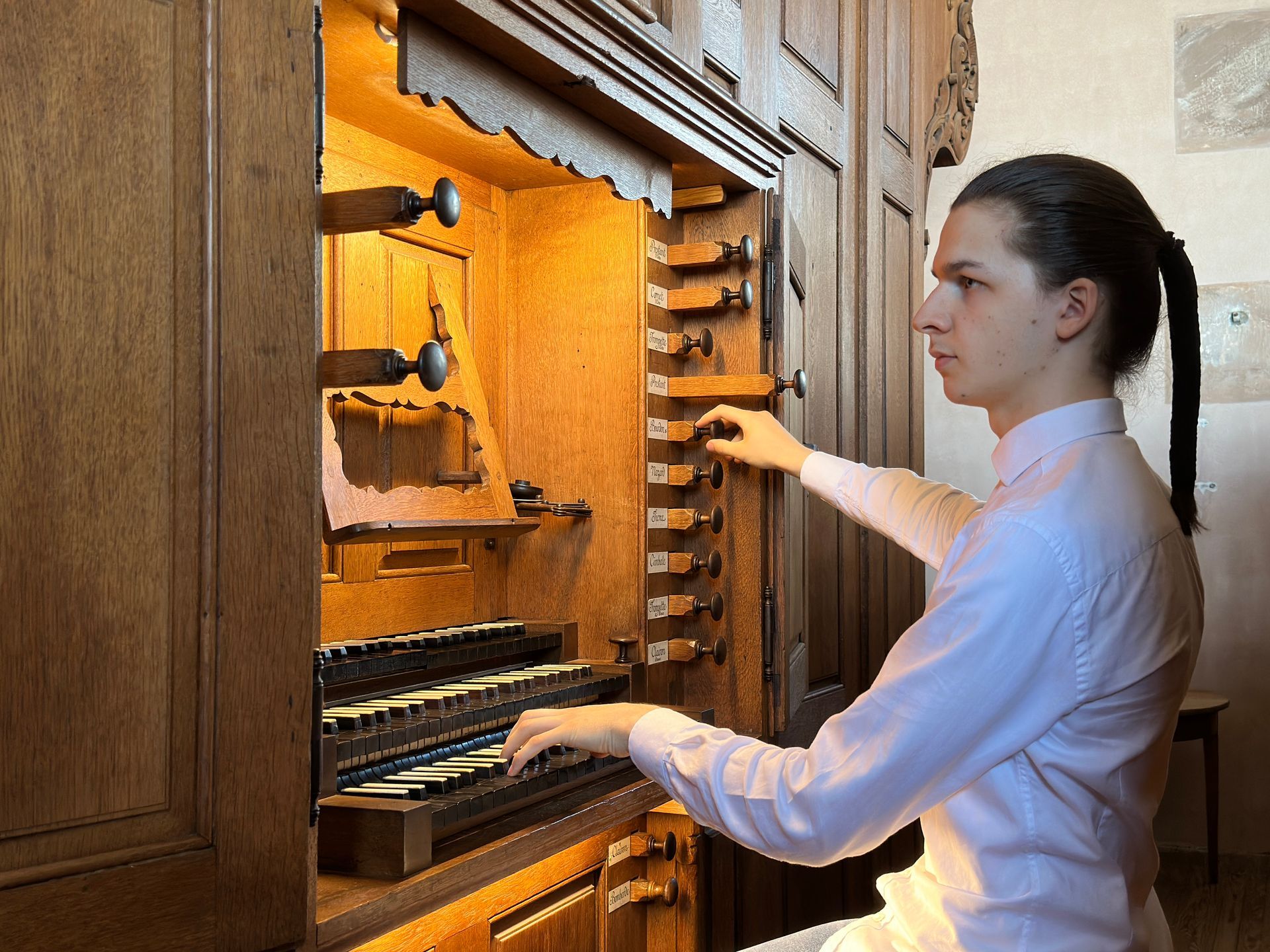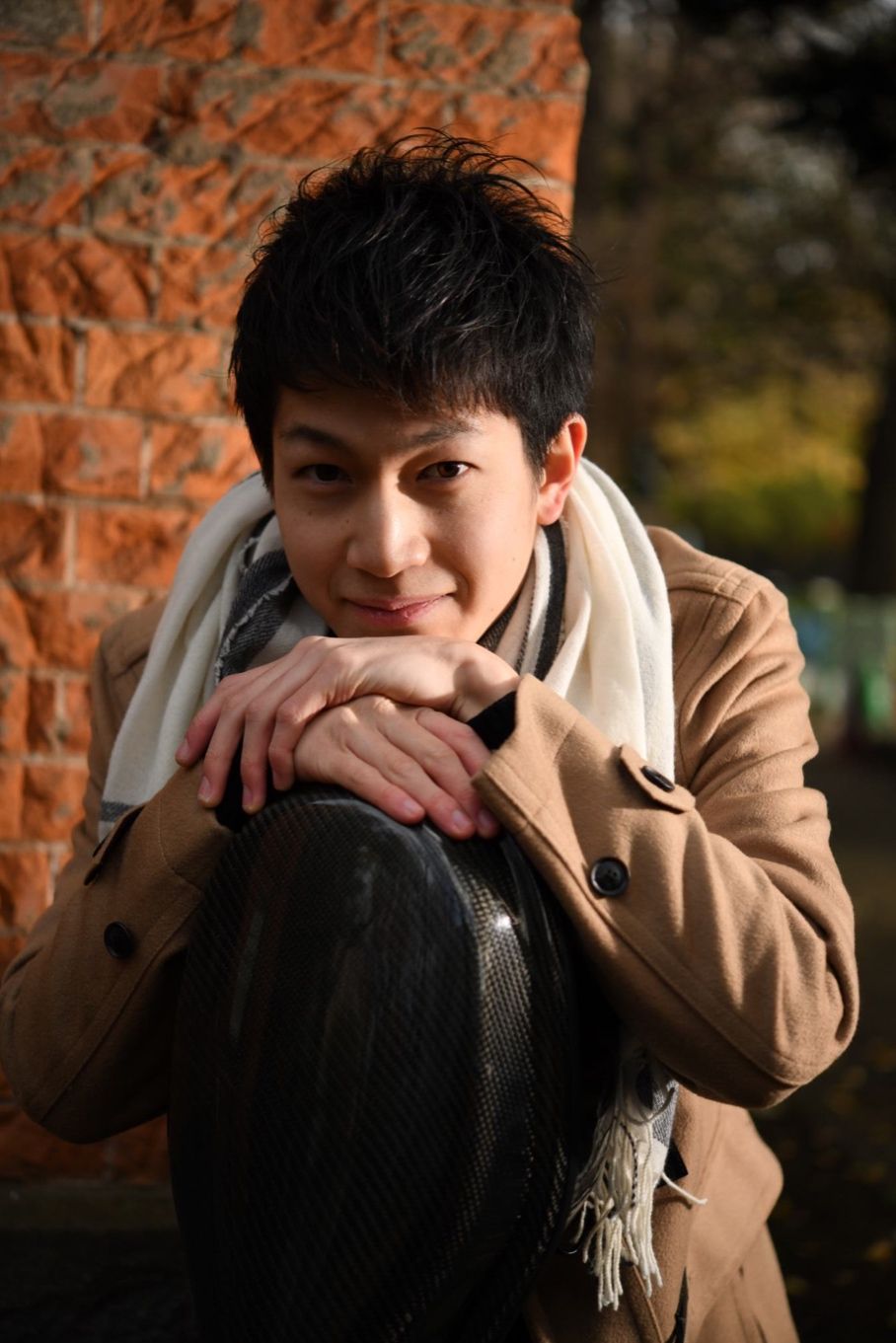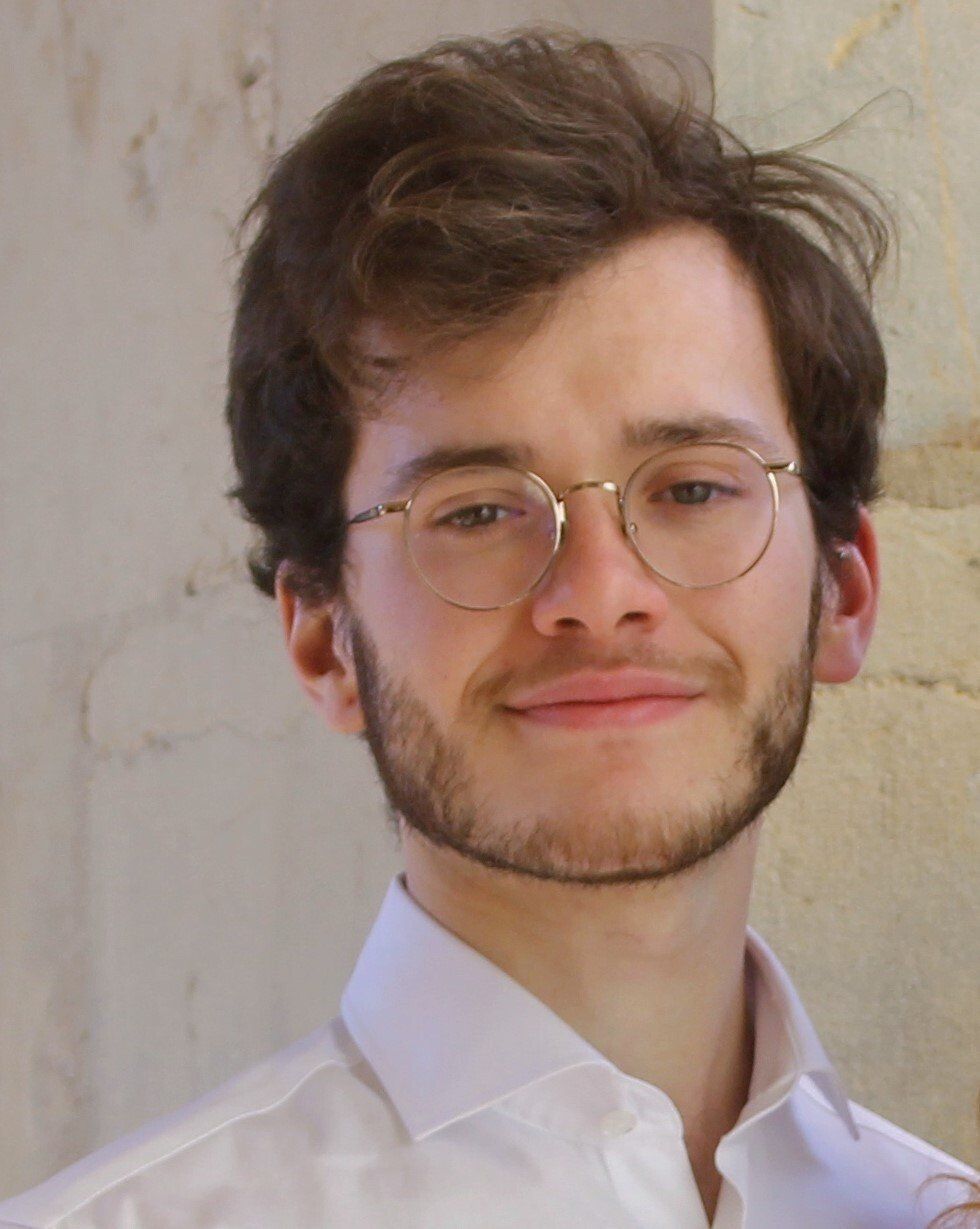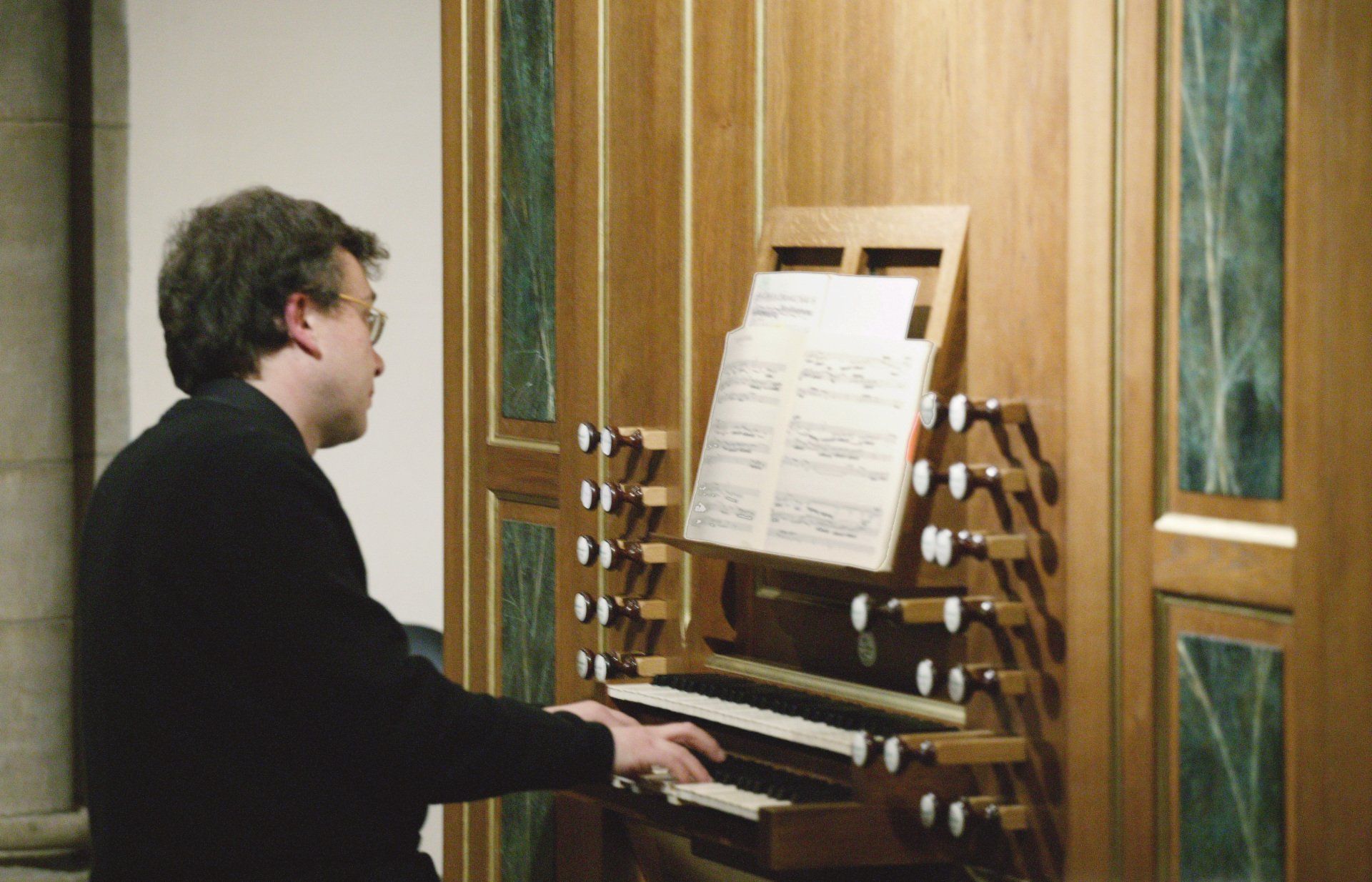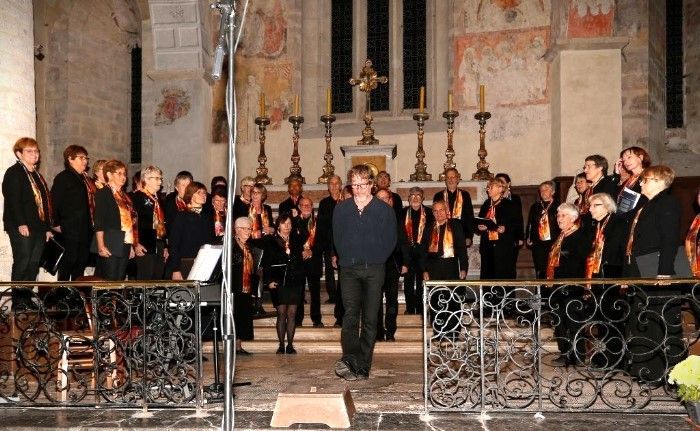Haru Shionoya (organ)
Haru Shionoya is a composer and organist of Japanese origin. After obtaining a bachelor's degree in piano from the Kunitachi University of Music in Tokyo, she joined the Conservatoire National Supérieur de Musique de Paris, where she earned a master's degree in writing and six prizes: harmony, counterpoint, fugue and forms, 20th-21st century harmony, advanced analysis, and orchestration. She studied there with Cyrille Lehn, Jean-Baptiste Courtois, Thierry Escaich, Claude Ledoux, Jean-Pascal Chaigne, and Marc-André Dalbavie. She also holds a Certificat d'Aptitude (writing) and a master's degree in pedagogy. She began playing the organ with Jean-François Hatton at the Conservatoire du 17th arrondissement in Paris, before joining the Conservatoire National Supérieur de Musique de Lyon in the class of François Espinasse and Liesbeth Schlumberger. There she also studied improvisation with Gabriel Marghieri, as well as harpsichord and basso continuo with Yves Rechsteiner. At the same time, she studied accompaniment with Denis Comtet at the Conservatoire du 17th arrondissement in Paris, and composition with Jean-Baptiste Robin at the Conservatoire à Rayonnement Régional de Versailles Grand Parc where she obtained her DEM in composition with honors. As composer-in-residence for the first class of the Académie de l'Opéra National de Bordeaux, she created Dido et Aeneas Revisited for four singers and five instruments (bandoneon, flute, clarinet, violin, cello). The same year, she won 3rd place at the 1st International Competition for Wind Quintet Composition in Dieppe. In 2024, she won the Grand Prix of the 1st International Competition for Composition for Young Audiences with the educational opera Momo, l'enfant pêche, inspired by the story of Momotaro. In 2025 she won the Royan-Orgue 2025 international composition competition in the solo organ category with her first organ piece Traces.
Miguel MUNOZ (trumpet)
Chihiro HIRAYAMA (organ)
Noah BRENCKLÉ (organ)
Daniel GOLDOBINE (organ)
Originally from Cannes, Daniel Goldobine began his musical studies at a young age at the Conservatoire in his hometown. After trying several instruments, he opted for the piano and then the organ, which became his favorite instrument. He obtained a Diploma of Musical Studies (DEM) specializing in Musical Culture and a DEM in Piano. A graduate of the Royal Conservatory of Brussels (Bachelors in organ and composition) and the Hochschule für Musik und Theater in Munich (Master of organ), and a Wölfel Foundation scholarship holder, he has had the opportunity to perform as a pianist at the Gnessin Academy in Moscow and in Vietnam, and as an organist on various emblematic instruments from France, Belgium, and Germany. In 2021, he was a semi-finalist in the Saint-Maurice International Organ Competition (Switzerland). Back in France, Daniel Goldobine has just completed his training for the Certificat d'Aptitude-Master in Pedagogy at the CNSMD in Lyon, and has been appointed piano professor at Musicalia and organ professor at the Conservatoire à Rayonnement Départemental in Valence. Since 2022 he has been the organist of the Michel-Merklin organ at Notre-Dame de Bellecombe (Lyon 6), in charge of monitoring the restoration work by Koenig.
Kanade ISHII (cello)
Born in Kyoto in 1998, Kanade began playing the cello at the age of 6. In 2017, he was admitted to Fumiaki Kono's class at the Tokyo University of the Arts, where he graduated four years later. Particularly passionate about French music, Kanade passed the entrance exam to the École Normale Supérieure de Paris in Henri Demarquette's class in 2021, where he studied for a year, also receiving guidance from Raphael Perraud that year before being admitted to the Conservatoire National Supérieur de Musique et de Danse (CNSMD) in Lyon in 2022. Kanade is currently receiving instruction from Anne Gastinel and Édouard Sapey-Triomphe. He participated in the 73rd Japan Student Music Competition in the Cello Division where he won the grand prize in 2019. He has also participated in numerous festivals and masterclasses such as the Tignes Music Academy, where he receives guidance from cellists such as Stven Isserlis, Roland Pidoux, Francois Salque, Philippe Muller and Ophélie Gaillard. Kanade currently plays a 1912 Georg Winterling cello and a Vigneron (fils) bow.
Brünhilde GRIS (violin) (and Louyse)
Brünhilde Gris began her musical studies with the violin at the age of 7 with Daniel Ispas and then at 9 began the organ with Michel Bourcier at the CRR in Nantes. After a scientific baccalaureate, she studied musicology at the Sorbonne via distance learning in parallel with the conservatory. In 2021 she joined Nathalie Geoffray-Canavesio's violin class at the CRR in Lyon where she obtained her DEM. She has been heard in chamber music at the Théâtre Graslin in Nantes (two violins and piano) and in St-Valéry-sur-Somme (violin and organ). Attached to orchestral practice, she has performed in several formations: - orchestra of the CRR of Nantes as part of the Folles journées, - orchestra of Linières for the production of several operas, - orchestra of the CRR of Lyon at the auditorium of Lyon, - Orchestre des Cybèles, - the Chambre Symphonique, - orchestra attached to the choir Fidélia in Lyon, - orchestra at the Nuits de Fourvière for the production of film music. Since 2023 she has been part of the Lyon orchestra Lunae where she is currently solo violin.
Louyse GRIS (organ)
Louyse Gris, organist and pianist, began her musical studies at the CRR in Nantes. There she studied piano with Catherine Gouget and organ with Michel Bourcier. Her interest in science initially led her to scientific studies. After two years of preparatory classes, she pursued mathematics at the Pierre and Marie Curie University in Paris, where she obtained her bachelor's degree in 2017. However, she chose a musical career. In 2016, she joined the CRR in Saint-Maur-des-fossés in Christine Fonlupt's piano class and then in 2018 in Éric Lebrun's organ class. This led her to obtain the DEM diplomas in piano and organ. She also studied composition there with François Saint-Yves. Alongside her instrumental studies, in 2019 she won the Harmony Prize at the CNSM in Paris, in Fabien Waksman's class. Since September 2020, she has continued her studies at the CNSMD in Lyon, in the organ class of François Espinasse and Liesbeth Schlumberger. She also studies piano accompaniment at the CRR in Lyon in the class of Laetitia Bougnol. She has performed in chamber music at the Théâtre Graslin in Nantes, in recital during the May of the Organ 2019 at the priory of Cunault (49), at the Temple Lanterne in Lyon, at the church of Sant Esteve in Granollers (Spain), in Saint-Valéry-sur-Somme, at the Temple d'Amiens and in Vouvant.
Annouk JOBIC (mezzo-soprano)
Annouk Jobic began her studies in opera singing in the Paris region alongside her studies in the viola. During her studies, she obtained her degree in musicology at the University of Paris VIII in 2016 and a prize for musical training at the CRR d'Aubervilliers in 2017. In 2019, Annouk joined the CNSMD in Lyon in the class of Isabelle Germain and Fabrice Boulanger. She has performed several solo roles on stage: Lazuli in L'Étoile (E. Chabrier), Public Opinion in Orphée aux Enfers (J. Offenbach), Mère Marie in Les Dialogues des Carmélites (F. Poulenc), Phoenice in Armide (CW Gluck), the Third Lady in The Magic Flute (W.A. Mozart) and Hélène in La Belle Hélène (J. Offenbach). Annouk particularly loves the art of Lied and Melody, she is used to interpreting the different great cycles of this repertoire in recital: Lieder eines fahrenden Gesellen and Rückert-Lieder by Mahler, Frauenliebe und leben and Liederkreis op. 39 by Schumann, La Bonne Chanson and Melodies de Venise by Fauré… She also performs as an oratorio soloist and has in her repertoire: Requiem by Mozart, Les Noces by Stravinsky, Rhapsodie pour viola by Brahms, Petite Messe solennelle by Rossini. Annouk Jobic is currently completing her studies at the CNSMD in Lyon and is working, as part of her research thesis, on the figure of Pauline Viardot as an inspiration for roles within the French Opera in the 19th century.
Marie PETIT-DESPIERRES (mezzo-soprano)
Marie Petit-Despierres, a young soprano, began her musical studies at the Conservatoire d'Alençon where she joined the symphony orchestra as first violin and obtained her CEM in violin. Her passion for singing was born from many years of choral singing within the choir and then at the Schola de l'Orne with Anne-Marie Concé. She joined Muriel Souty's lyric singing class and continued her training as a singer at the CRR de Tours with Noémi Rime and Franck Leguérinel. In 2019, she obtained a DEM in lyric singing as well as a degree in musicology. Since September 2020, she has been studying at the CNSMD in Lyon in the class of Mireille Delunsch and Sylvie Leroy. During masterclasses, she met Véronique Gens, Marie-Thérèse Keller, Vivica Génaux, Vincent Letexier, Delphine Haidan, Peter Kooij, Irène Kudela, Marie-Ange Todorovitch. In 2019, she performed the role of Cleopatra in Julius Caesar in Egypt (Handel) at the Tours Opera. In 2020, she played Pedro in Don Quixote (Massenet) conducted by Gwennolé Rufet at the Tours Opera. In 2021, she joined the additional choir of the Tours Opera. She was seen at the CNSMDL as Papagena in The Magic Flute (Mozart) in 2021. She will play Cupid in Orpheus in the Underworld (Offenbach) in February 2023. Marie is regularly a soloist in works for choir and orchestra. In 2018, she was a soloist in Beethoven's Choral Fantasy at the Tours Opera. She sang the soprano solos in numerous oratorios such as Handel's Messiah, Bach's Magnificat, Vivaldi's Gloria, Monteverdi's Magnificat, Fauré's Requiem, and Bach's cantatas.
Teddy DANJEAN (Cornett )
Hadrien FOURNIER (organ)
Marion JEGOU (soprano)
Joffrey MIALON (organ)
Esther JOO (violon)
Luca AKAEDA SANTESSON (organ)
Marie DUMAS (organ)
Claire-Ombeline MUHLMEYER (sackbut)
Natsumi SAWA (organ)
Born in Ishikawa, Japan, Natsumi Sawa began playing the piano at the age of 4 and the organ at the age of 7. She entered Senzoku Gakuen University of Music in 2012, where she studied organ with Yumiko Ogino and piano with Masako Yoshitake. In 2016, she graduated with the highest grade in her class in organ performance and was then selected for the annual concert for young graduates at the Tokyo Metropolitan Theatre. After a year of advanced training, she became an intern at the Minato Mirai Concert Hall in Yokohama, where she received instruction from Hatsumi Miura. Natsumi Sawa has given numerous concerts in various venues across Japan, such as the Opera City in Tokyo and Muza in Kawasaki. She has also performed various concerts for young audiences and organized workshops for young organists. In 2018, Natsumi was admitted to the CNSMD in Lyon under the direction of François Espinasse and Liesbeth Schlumberger, and also studied harpsichord with Yves Rechsteiner and improvisation with Gabriel Marghieri. In recent years, she has been invited to concerts and festivals throughout France, including at Saint-Séverin and the Temple de l'Étoile in Paris, at the Saint-Jean Cathedral in Lyon, and at the Sainte Croix Cathedral in Orléans. She also participated as organist in residence at the 58th Festival de la Chaise-Dieu. She broadens her field of expertise to free improvisation with Jean-Marc Foltz; and gives improvisation concerts with images, stories, film, or even accompanied by yoga. Natsumi Sawa participates in various international competitions and in 2023 won second prize at the Jean-Louis-Florentz-Académie des Beaux-Arts International Organ Competition. Currently, Natsumi Sawa is organist at the Saint-Augustin-de-la-Croix-Rousse church in Lyon and is completing her Master's degree in organ performance at the CNSMD in the same city.
Haruna NAKAIE (viola da gamba)
Marguerite ROUTCHKINA (organ)
Cécile BLAIS (cornett)
Fanny COUSSEAU (organ)
Aurore ALIX (cello)
Tomas MIHALIK (organ)
Yanis DUBOIS (organ)
Gilles VEYSSIÈRE (organ)
Clément PERRIER (organ)
Arnaud SCHOTTE (organ)
François ESPINASSE (organ)
Born in 1961, François Espinasse studied music at the Toulouse Regional National Conservatory. He won first prize in organ in Xavier Darasse's class in 1980, and continued his studies the following year with André Isoir. He was a prizewinner at the international competitions in Toulouse (contemporary music in 1986) and Tokyo-Musashino in Japan in 1988. Co-titular organist at the St. Séverin church in Paris, he is also a professor of organ at the Conservatoire National Supérieur de Musique de Danse de Lyon and a tutor at CEFEDEM Aquitaine. In early 1998, he was appointed reporting member of the Higher Commission for Historical Monuments (organ section) and the Commission for Unprotected Organs for the Ministry of Culture. He also gives master classes in Europe and Asia (Korea, Japan) and participates in the juries of international competitions (Chartres, Odense, Tokyo, Toulouse, etc.). His discography includes works by Guilain and Marchand on the Riepp organ of the Trinity of the Ottobeuren Abbey, the sonatas of CPE Bach on the Westenfelder organ of Fère-en-Tardenois, works by Bach on the Ahrend organ of Porrentruy, as well as works by Clérambault, Dumage and Marchand on the Micot organ of St Pons de Thomières. In 2002, he recorded a disc in tribute to Xavier Darasse during the Toulouse Festival including works by Messiaen, Darasse and Amy (Hortus). François Espinasse regularly performs in recitals (Innsbrucker Festwochen der Alten Musik, Lisbon Festival, Vienna Konzerthaus, in Israel, Korea, Japan and in Uruguay for the Montevideo Organ Festival,) but also as a soloist with the Radio-France Philharmonic Orchestra, the NHK Orchestra under the direction of Charles Dutoit and Myung-Whum Chung. He works regularly with composers on their works: Gilbert Amy, Jean-Yves Bosseur, Xavier Darasse, Pierre Farago, Jean-Louis Florentz, Jacques Lenot, François-Bernard Mâche,
Yves LAFARGUE (organ)
Yves Lafargue was born in 1969. He began his organ studies with Georges Lartigau and then with Aude Heurtematte. After completing his studies in the class of Jean Boyer and Liesbeth Schlumberger at the CNSMD in Lyon (1998), he held the position of resident organist at the Sapporo Concert Hall (2000). Back in France, he successively led organ classes in Mâcon, Le Puy-en-Velay, and Grenoble. He is currently professor of organ at the Conservatoire de Lyon (CRR), and titular organist of the Notre-Dame-de-Fourvière basilica. A concert performer, he is regularly requested to collaborate with vocal and instrumental ensembles: Spirito, Orchestre National de Lyon, Orchestre de Mâcon… In 2019, he was keen to celebrate Berlioz with transcription programs, from solo organ to trio concert (with Karine Deshayes, soprano, and violist Lise Berthaud, at the Auditorium of Radio-France). A creator, he composes organ pieces (ed. Delatour, ed. Chanteloup-Musique) and liturgical music (Psalter of Fourvière, ed. Le Sénevé; Notre Père, ed. Voix Nouvelles…); among his transcriptions for organ, he notably produced a reference version of the accompaniment to Fauré's Requiem (ed. Chanteloup-Musique). Finally, passionate about drawing as much as writing, he published with Hortus Editions, a collection of illustrated short stories where music and the organ occupy a prominent place: Didascalie et autres pièces de fantaisie.
Loïc MAILLIE (organ)
Born in La Baule in 1947, Loïc Mallié pursued general studies (he has a degree in law) and musical studies at the Rennes Conservatory (classes of Pierre Froment and Catherine Cohen) and then at the Conservatoire National Supérieur de Musique de Paris (classes of Olivier Messiaen, Henriette Puis-Roget, in particular) where he obtained five first prizes: organ, improvisation, harmony, counterpoint and fugue. He also holds several international prizes for improvisation on the piano and organ, including the first Grand Prix at the Chartres International Competition. For a long time, he was co-titular organist of the great Cavaillé Coll organ in Saint-Pierre de Neuillu; alongside Jean-Claude Henry, then titular organist of the great organ of Saint-Pothin in Lyon, and since 2011 he has been titular organist of the great organ of La Trinité in Paris, alongside Thomas Lacôte and Jean-François Hatton. He has taught writing and improvisation at the National Conservatories of Music and Dance in Paris and Lyon. He has been a professor of "acumpanamiento y improvisation" at Musikene (San Sebastian), a centro superior de musica since November 2001. He also has a significant activity as a concert artist (Europe, America, Japan), and composer (pieces for organ, orchestra, chamber music). Finally, he is the author, with Olivier Latry, of a book on the organ works of Olivier Messiaen.
Gabriel MARGHIERI (organ)
Gabriel Marghieri is the organist at the Basilica of the Sacred Heart of Montmartre in Paris and at the Sanctuary of Saint Bonaventure in Lyon. He is a professor of Analysis and Improvisation at the Conservatoire National Supérieur de Musique in Lyon, after having been, among other things, a lecturer at the Conservatoire National Supérieur de Paris. He gives concerts, courses or conferences throughout Europe, in Japan and Canada, and has recorded discs devoted to Franz Liszt (Harmonia Mundi Radio France), Henri Carol (Solstice) or his own music, since he is also a composer, author of works for organ or different ensembles, or even liturgical or educational pieces. He participates in numerous juries, was a member of the Commission for New Organs at the Ministry of Culture, and wrote articles for various magazines. He is also responsible for the Organ Hours and founder of the Friends of the Organ of Saint-Bonaventure in Lyon. Gabriel Marghieri, who was a student of Henri Carol, René Saorgin, Marie-Claire Alain, Michel Chapuis and Loïc Mallié, obtained four First Prizes from the CNSM of Paris and Lyon, the national certificate of Aptitude for teaching the organ, as well as the International Grand Prizes of Bordeaux and Saint-Albans (England) for interpretation, and Chartres for improvisation.



